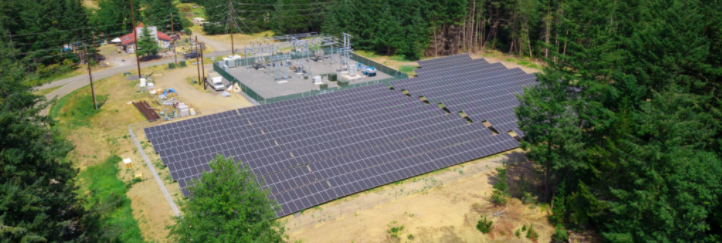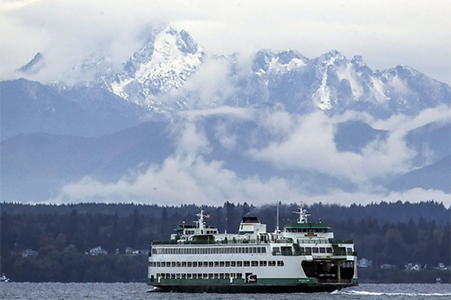||| FROM STATE DEPARTMENT OF COMMERCE |||
OLYMPIA, WA – The Washington State Department of Commerce today announced approximately $3.9 million in grants from the state’s Clean Energy Fund for 18 electricity grid modernization projects across the state. As Washington’s utilities advance towards the state’s goal of 100% clean electricity by 2045, the projects will advance a variety of renewable energy technologies and electricity system innovations.
Many of the projects will contribute to grid resilience and enable flexibility and reliability of power for emergency services in the face of wildfires and other natural disasters, particularly in rural and underserved communities. The list of awards includes a partnership with Yakama Power and grants to Avista and Snohomish County PUD that include partnerships with the Spokane Tribe of Indians and Tulalip Tribe, respectively.
Modernizing Washington’s Electric Power Grid
 Since 2013, the Clean Energy Fund has invested $14.3 million in 29 projects across the state. Public and private utility partnerships in Washington are leading the way in renewable energy, battery storage and more technology innovations to modernize and increase resilience of our electricity grid Since 2013, the Clean Energy Fund has invested $14.3 million in 29 projects across the state. Public and private utility partnerships in Washington are leading the way in renewable energy, battery storage and more technology innovations to modernize and increase resilience of our electricity grid |
“Prioritizing resilience and affordability are essential to achieve an equitable transition to a clean energy economy for Washington state,” said Commerce Director Lisa Brown. “Projects like these, supported through the Clean Energy Fund, demonstrate the value of partnerships between our state’s utilities and communities as we work together to transform our state’s electric grid.”
The projects awarded funding, from a pool of 22 applications, are:
- Avista – $240,000 to design and engineer a solar and energy storage microgrid project in partnership with the Spokane Tribe of Indians. This microgrid project will provide energy resilience during wildfires, energy independence for critical facilities, and energy billing benefits for customers.
- Energy Northwest – $333,575 to carry out a project with public utilities for an automated system that seamlessly controls different electric grid resources, such as solar panels, batteries, and on-demand devices serving multiple locations and customer needs.
- Energy Northwest – $149,983 to investigate, co-create and complete preliminary design for grid-interactive efficient buildings for Aberdeen and Hoquiam school districts and The Evergreen State College. Grid-interactive efficient buildings are also called “smart buildings” because they automatically respond to times of peak demand on the power grid to reduce energy use to keep costs down while maintaining comfort of people inside.
- Kittitas County PUD – $48,500 for analysis and preliminary design for a .5 MW/20MWh battery energy storage system paired with either a 150 kw solar array or a 100 kw in-stream hydropower generator. This project would provide uninterrupted backup power to a remote rural community that is vulnerable to outages.
- Orcas Power and Light Cooperative (OPALCO) – $150,000 for analysis and preliminary design for a solar plus storage microgrid with the capacity to support OPALCO’s electrified medium-duty truck fleet, public and private light duty vehicle charging, electric bicycle charging, Washington State Ferries serving Friday Harbor and other marine craft.
- Orcas Power and Light Cooperative (OPALCO) – $150,000 for analysis and preliminary design for a potential tidal energy project located in the Rosario Strait. Tidal energy could increase resilience and energy independence for island communities, particularly during winter months when solar microgrids have lower production.
- Orcas Power and Light Cooperative (OPALCO) – $165,000 for detailed design and engineering to build a biomass combined heat and power facility with microgrid controls. The facility would be fueled by waste materials such as vegetation collected during maintenance work around power lines or forest health maintenance. The project would reduce winter peak demand charges and increase energy independence for the islands.
- Puget Sound Energy – $150,000 for analysis and preliminary design to add a renewable hydrogen and/or renewable natural gas-powered generator to a planned solar plus storage microgrid at Tenino High School. This addition would help meet the community’s requirements to use the school as an emergency shelter, particularly during winter months.
- Seattle City Light – $150,000 for feasibility analysis and preliminary design to create a fully carbon neutral ecodistrict at the Seattle Center that could serve as a community emergency center during natural disasters. This project will explore technologies including battery storage, expanded on-site solar, waste heat capture, regenerative power systems, and more. The project is in collaboration with Climate Pledge Arena and Seattle Monorail.
- Seattle City Light – $150,000 for analysis and preliminary design for an ecodistrict in the area surrounding the Seattle Central College campus in Seattle’s Capitol Hill neighborhood. This system would leverage shared heating and support a transition from natural gas heating to electrified heating and thermal storage.
- Seattle City Light – $500,000 to conduct detailed design and engineering for a microgrid using second-use batteries from transit vehicles. The system will increase the resilience of electricity supply to an increasingly electrified public transit fleet as the city decreases diesel emissions in a community experiencing high levels of environmental health disparities.
- Seattle City Light – $500,000 for detailed design of a 10-25 MVA shore-side battery energy storage system. The system will serve Washington State Ferries Colman Dock hybrid ferry charging and provide electricity grid support for the waterfront area.
- Snohomish County PUD – $150,000 for analysis and preliminary design of a neighborhood-scale microgrid in South Everett. The microgrid would increase grid reliability and provide emergency backup power for the community, including low-income households experiencing high levels of environmental health disparities, such as impact from peak heat and cold periods. The project is in partnership with the City of Everett.
- Snohomish County PUD – $150,000 for analysis and preliminary design of a renewable energy-based microgrid at the Tulalip Tribal Government Administrative Building. The project’s goal is to maintain government and emergency response facilities in the event of a long-term power outage.
- Snohomish County PUD – $150,000 for analysis and preliminary design of a renewable energy-based microgrid at the Tulalip Tribes Gathering Hall. The project’s goal is to create a shelter for community members in the event of a long-term power outage.
- Snohomish County PUD – $150,000 for analysis and preliminary design to integrate up to 50 MW of long-duration energy storage into an existing, early stage 21.6 MW solar project under development by Tulalip Tribes and its partners within Snohomish PUD’s service territory.
- Tacoma Power – $99,354 for analysis and preliminary design for an innovative, community-centric microgrid design that would support Franklin Pierce School District’s transition to electric school buses. The microgrid would integrate solar, upcycled batteries and idle bus capacity.
- Yakama Power – $500,000 to design, purchase equipment, and install an electricity grid controls system. The project supports grid modernization and integration of solar and other renewable resources and creates workforce training opportunities for members of the Yakama Nation.
“City Light is thrilled and honored to receive these four awards that will move us toward our vision of partnering with customers to create our energy future. We appreciate the support of the Department of Commerce for these bold and innovative projects that will, over time, result in a modern and resilient grid that supports electrification and deep decarbonization,” said Debra Smith, Seattle City Light General Manager and CEO. “Our customers, and the region as whole, benefit from this exploration and the adoption of new distributed energy technologies.”
“OPALCO is grateful for the opportunity to take these critical steps toward building local energy resilience for our remote island territory,” said OPALCO General Manager Foster Hildreth. “As a member-owned cooperative, we couldn’t do it without the support of these grants from the Department of Commerce – and our ability to maintain reliability for our membership will depend on projects like these well into the future.”
“Avista is grateful to receive this Clean Energy Fund grant, which provides the opportunity to partner with the Spokane Tribe of Indians to create solutions to help enhance grid reliability and resiliency, and more affordable energy. Over the next two years, we will build upon the clean energy steps the Spokane Tribe has already taken and develop a suite of project designs that meet the objectives of the Spokane Tribe’s energy roadmap and achieve Avista’s goals. Throughout the process, Avista’s Equity Advisory Group will gather input from Tribal members. What we learn will create a blueprint for options that Avista can apply to other communities we serve that face similar challenges,” said Avista Senior Vice President of Energy Delivery Heather Rosentrater.
All grant funds are contingent upon execution of final project contracts with Commerce. To increase accessibility for utilities that had not received previous awards, this funding round allowed for selection of predesign and design project as well as equipment purchase and installation. It also prioritized equity in project outcomes, including a required equity and community benefits narrative and scoring tied to the Department of Health’s Environmental Health Disparities mapping tool.
Washington’s Clean Energy Fund supports research, development and deployment of clean energy technologies, smart grid innovation, energy efficiency and more. To date, the fund has invested more than $131 million in 98 transformative projects and clean energy job creation around the state.
To learn more, visit the Grid Modernization webpage. Read about other Clean Energy Fund grants here.
**If you are reading theOrcasonian for free, thank your fellow islanders. If you would like to support theOrcasonian CLICK HERE to set your modestly-priced, voluntary subscription. Otherwise, no worries; we’re happy to share with you.**







